Fandom Power: The Campaign to Save "Our Flag Means Death" as a Model for Effective Grassroots Collective Action
The value of praxis in silly and unusual places, and why we have what it takes to win.
The Necessary Background
Our Flag Means Death has been responsible for a lot of positivity in my life over the past few months. For the unfamiliar, Our Flag is an HBO Max romantic comedy featuring fictionalized versions of legendary real-world pirates Blackbeard (Taika Waititi) and Stede “The Gentleman Pirate” Bonnet (Rhys Darby), supported by a delightful ensemble cast. In the show, Blackbeard and Stede become an unlikely romantic pairing Rhys Darby has compared to Danny and Sandy in Grease—bad boy meets pretty loser.
I initially watched season one of the show when it came out in early 2022. I loved it and recommended it to others, but due to a difficult time in my personal life, it got put on the backburner. My full-on hyperfixation with the show began more recently, and started as many have for me in the past. I watched season two of the show in the fall of 2023 while recovering from a breakup, seeking an engaging distraction. When I didn’t want the experience to end, I started reading fanfiction, then I made an Our Flag Means Death-specific Twitter account so I would have a dedicated space to engage with content around the show.
One day, someone on Twitter posted a “fan map” where users could drop a pin on their general location, and I realized there are other fans of the show who live near me. I started following a few of them, which evolved into conversations on Twitter with folks who had written fanfiction set in my city. I found myself walking around my neighborhood and seeing it in a new light, imagining my favorite characters in a familiar setting.
After that, I did something I’d never done with any other fandom: I took my participation into the real world. I found out about “Calypso’s Birthday,” an Our Flag-themed event at a local queer bar based on a celebration that takes place in the show. I went with a good friend who is a more casual fan, and made a several new friends there as well. Some were people I had spoken to on Twitter, others were individuals I was just meeting for the first time. I had an absolute blast.
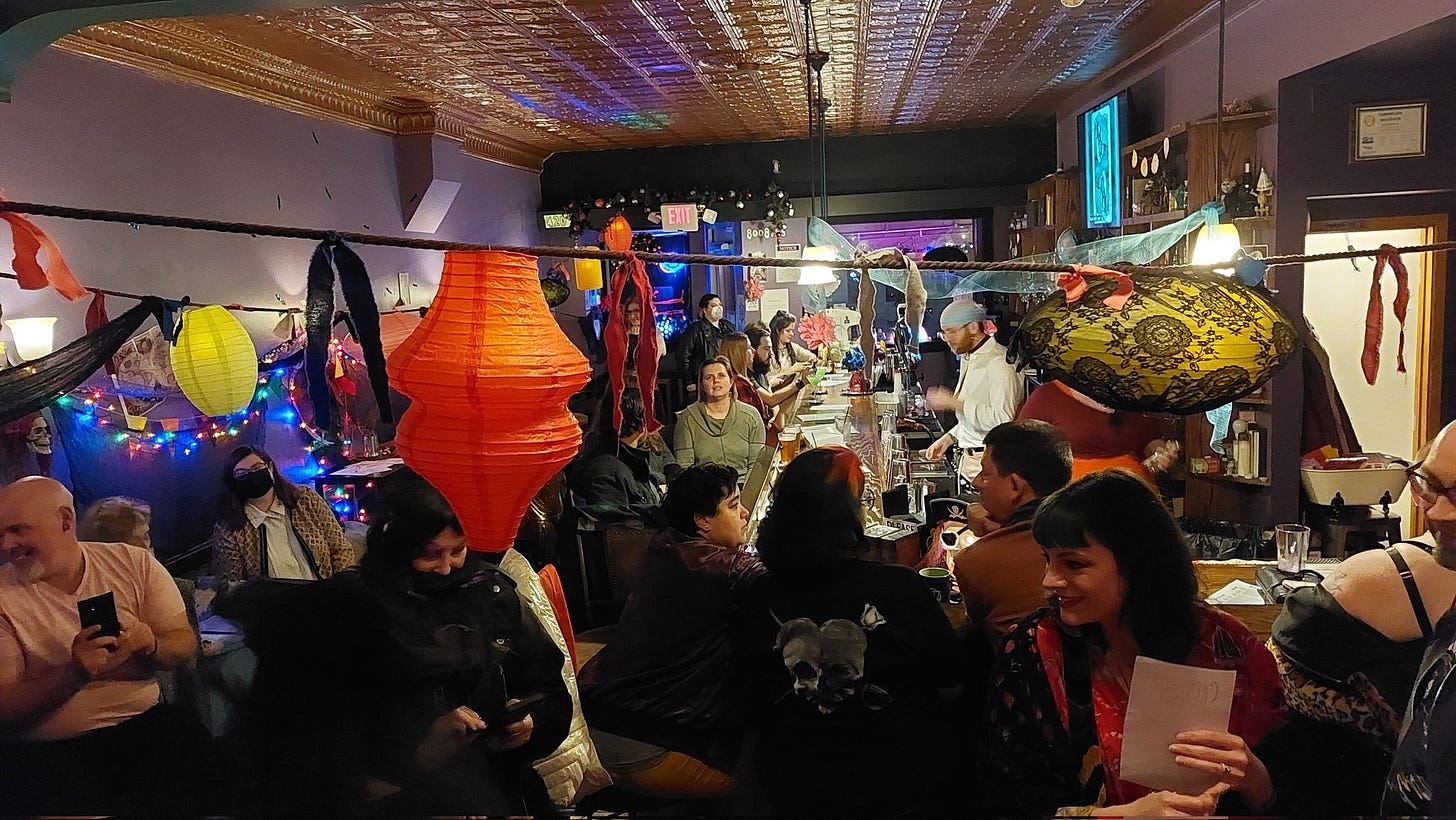
It was after Calypso’s Birthday that things really started taking off with my involvement in the fandom. A friend I met at the event added me to a wonderful, absolutely unhinged Twitter group chat for other hardcore fans. Upon entering, the members immediately and aggressively welcomed me by name and launched into a primer of deep group chat lore that had me laughing out loud at the coffee shop I was in. It’s rare, I think, to be welcomed into a group so thoroughly that participants are eager to explain all of their inside jokes to you right off that bat, but that’s the general spirit of the Our Flag Means Death fan community.
It was a silly, fun time all around. I was thrilled to be an active participant in fandom for once rather than a consumer and bystander: it feels really good to be able to share a deeply-held interest with others.
And then…
Our Flag Means Death is critically quite successful and has been the subject of many articles praising it for its straightforward depiction of queerness, hilarious and heartfelt writing, diverse cast of characters, and its overall originality. For this reason, the cancellation felt shocking and abrupt. The show was always intended to have a three season arc, at minimum. Though season two does not end on a cliffhanger, it was clearly not intended to be a finale.
To say that fans of the show were disappointed is an understatement.
We all know capitalist culture can be extremely dark and isolating. In a world like the one we live in, a work of media like this can be an anchor and a source of joy—in this case, a particularly queer joy. There has never been a show like Our Flag Means Death for queer people. The majority of the fanbase seems to be around my age, in our thirties and older, eagerly drinking in a type of queer media we’ve been craving for our entire lives.
Adequately describing the magic of the story itself and the ways it uniquely inspires joy requires a separate essay—one I also plan to write. Meeting the character of Stede Bonnet is why I started this Substack in the first place. He is why I have been speaking out more, writing more, meeting more people. And I don’t mean because I wanted to be involved in the fandom: it’s bigger than that. Stede is enthusiastic, earnest, awkward, often mediocre, but ready to try and fail, a deeply caring and thoughtful character. These traits are framed as desirable, good, worth celebrating, and something to fall in love with. Seeing Stede through Blackbeard’s eyes—and through the fandom’s eyes—has radically reframed my sense of self.
For many, including myself, the show and its fandom became a crucial source of community. After the news of cancellation, I came across many posts from people who were terrified that the Our Flag fan community would fall apart without the show to bind it together. As a person who values community above all else, and who is fortunate and grateful to have community as a core part of my daily life, seeing this reaction triggered something in me.
It’s actually quite ridiculous how quickly I shifted gears after my initial moment of deep devastation. Minutes after reading the annoucement, I came across a post from Renew as a Crew. Renew as a Crew is a grassroots, fan-run organization that has existed in some form since late 2022, though it only went public shortly before season two aired. The organization has utilized a variety of creative methods to push for renewal, and has quickly become one of a few central hubs for general activity within the fandom. After the cancellation announcement, Renew as a Crew reacted quickly, shifting tactics from renewal to fighting for a reversal of the cancellation.
This solidified the sense of hope and resolve that had already been building in me. Someone is telling me there’s still a chance? Okay, I’m all-in.
Successful Collective Action: What Does It Take?
For years, I have been studying what makes social movements effective. I’ve wondered: how do we build a better world? Is there really any hope of doing that given present circumstances? After immersing myself in social ecology and other theory, I’ve come to the conclusion that yes, there are paths forward and ways to create change.
At present in the United States, we do a lot of demonstrating around our causes. This can be an important way to show social support for or against something and is often crucial in raising morale, the importance of which should not be understated. However, I’ve long been frustrated that the modus operandi for activism in this country seems to be show up, chant things, go home. Social ecologist Murray Bookchin, whose theoretical roots lay in anarchism, felt the same. He voiced his distaste for indirect, performative activism among self-identified anarchists quite vehemently:
Anarchists [are] losing contact with the need for an organized, collectivistic, programmatic opposition to the existing social order. Invertebrate ‘protests,’ directionless escapades, self-assertions… [this is] little more than introspective personalism that denigrates responsible social commitment… [these are] encounter [groups] variously renamed a ‘collective’ or an ‘affinity group’; [this is] a state of mind that arrogantly derides structure, organization, and public involvement; [a] playground for juvenile antics.
—Bookchin, Social Anarchism or Lifestyle Anarchism, 1995
To challenge Bookchin here, there are a lot of legitimate reasons for the trend toward lower-stakes activism that may be perceived as performative, certainly not least of which is a deep history of US government infiltration in and dismantling of successful social movements. However, and especially given the oligarchical state of our political system, this has left most of us feeling stuck, paralyzed, like there’s no way to create meaningful change in our systems or institutions.
I am far from an expert, but there are a few things I’ve learned about what makes a movement effective. First of all, there must be a clear goal, and a clear sense of the person, organization, or system that you need to target to achieve your goal. Then, succesful organizing must involve direct action that has a tangible impact on your target, which often requires a sense of boldness and a willingness to take risks. One example is the 1970 takeover of a neglected hospital by street-gang-turned-political-organization The Young Lords in a demand for better healthcare after attempts to fix their hospital in socially-sanctioned ways went ignored. A central organized group like The Young Lords is key to a successful movement: the group can strategize on a plan of action, serve as a model, and cause ripple effects far beyond what the group does by itself.
Beyond that, there really is no playbook. Each successful movement is a unique response to a specific problem, and a tactic that works for one revolution may not work for another. Movements must be flexible and reactive. There must be a willingness to throw a lot of things at the wall to see what sticks, and this involves a lot of brainstorming and bouncing ideas around.
Though building a successful movement may not be a science, there are a few key ingredients I’ve identified. One is a sense of creativity, which is necessary in order to craft a solution built for the particular problem your movement aims to address. Another—extremely core to success—is building a strong sense of community within your movement that goes beyond the specifics of activism. Strong movements are built when participants eat meals together, throw parties, sing, dance, laugh together.
That last part is a crucial piece on its own. Successful movements must make fostering a sense of joy, hope, and optimism a core part of their operation, otherwise participants burn out. If you can keep hope alive, allow people to take breaks, and maintain a sense of humor in the face of obstacles and setbacks, you can keep the fire of momentum burning for a long, long time—and this is often necessary to create change.
Of course, before you can do any of this, you need a group of individuals who are fired up about a cause. Let’s get back to Our Flag Means Death.
#SaveOFMD
A central hashtag emerged early on in the campaign to reverse the cancellation of Our Flag Means Death: #SaveOFMD. While there have been many “moments” like #SaveOFMD on the internet, where a trend effectively creates a limited-duration world of its own, I have never personally participated in anything like this before. Watching this all go down has been endlessly captivating, frequently ludicrously funny, often powerful, empowering, and always deeply communal. I never know what insanity the next day will bring and find it hard to tear myself away.
Participating in an active trend like this is like being one neuron within a neural network. A person, or a group like Renew as a Crew, conceives of an idea. The idea goes out, others endorse and respond, it spreads and transforms. It inspires other ideas that build upon it, or potentially, disagreement that takes on a life of its own. Things ebb and flow and keep moving forward.
To use a different, social ecology-based metaphor: this movement is operating like a flock of birds, or a school of fish. There are no hierarchical leaders, but there are some birds towards the front of the group. The birds are all swirling around, but there’s movement in a general direction. There are smaller sub-groups within the larger one. The flock can course-correct and change direction—and yes, we manage this quite effectively without an authority to direct us. It is an endless demonstration of the possibilities of the combined power of thousands of minds working together, a sped-up microcosm of every city, every culture, everything humans have ever collectively built together.
#SaveOFMD has every single component of successful grassroots movements.
It has:
A large, devastated fanbase who wants the show back—one that is heavily queer and politically progressive (we have a personal, identity-politcs-based stake in the story), millennial-age and older (we have some combined life experience and maturity), and neurodivergent (there is a lot of obsessive dedication among us.)
A central organizing group, Renew as a Crew, working on large-scale efforts like the petition (please sign!), fundraising for billboards in Times Square and flyover banner planes in Los Angeles, running letter-writing and fax campaigns and phone banks, soliciting art, and facilitating a wide variety of other endeavors that keep fans motivated and working toward our goal in ways that are achievable for the average person.
There are also smaller, decentralized groups making waves (sub-groups of birds.) My original Twitter group chat is comprised of individuals who create a lot of fan works and have a large collective following, and we have often been coming together to boost each others’ ideas. (Proud to say we are the origin of the Ziploc post.)
The neural-network-flexible-creativity of the #SaveOFMD trend, which has generated an impossible-to-catalog array of sub-trends. #SaveOFMD has appealed to celebrities for help, tried to get the Pittsburgh Pirates baseball team on board, posted bizarre art, wished entertainment executives a happy birthday, led a “pirate raid” on posts about the Emmys, and successfully engaged brands—leading to an ongoing and hilarious conversation between the campaign and personal lubricant brand Astroglide. Tune in on Friday 1/19/24 when Astroglide will be live-tweeting their first watch-through of the show.
On that note, the neural network is inherently a 24/7 meme factory, so spirits are generally high and everyone is in a constant state of laughter. Even bad news or setbacks are quickly meme-ified. This has the additional result of keeping the campaign trending and in the popular consciousness.
We’re a community that already came together for something outside of activism—a love for the particular work of art that is Our Flag Means Death, giving the movement indefinite staying power.
The initial, obvious target of the campaign is HBO itself, and the campaign has impacted the company on a variety of levels, coming from seemingly every angle. Renew as a Crew is focused on a persistent, positive, and creative approach in getting HBO to pay attention. HBO’s phones are ringing off the hook, their email servers are strained and bouncing responses, their physical mailboxes are flooded. They cannot get out a post on social media without being inundated by Our Flag Means Death fans. As of today, 1/18/24, Our Flag Means Death has been nominated for a GLAAD Award, but HBO has yet to acknowledge this because they know what will happen. We’ve made ourselves an incorrigible nuisance—a group of polite menaces. HBO has no choice but to listen.
Though HBO as a whole is the campaign’s primary target, a specific executive was singled-out early on as allegedly dealing the show its killing blow: Warner Brothers Discovery CEO David Zaslav.
For better or for worse, having a particular individual to target, or feel you are targeting, tends to galvanize people. Changing the mind of one individual feels more concrete and doable than changing whole systems. Anger toward Zaslav has remained a locus in the campaign among fans—he is a perfect figurehead for every wealthy executive at every entertainment conglomerate who doesn’t blink twice before destroying beloved works of art.
The discourse surrounding Zaslav’s decisions broadened the inherent possibilities of this campaign for me. I already thought we had a decent chance of either getting a reversal of the cancellation by HBO, or making our numbers look appealing enough to get Our Flag Means Death picked up by another network. Now, I think we may have formed not just be a successful campaign to save a show, but a central hub for all kinds of future collective action. First order of operations: boldly demonstrating that entertainment companies must listen to consumers about the art we want to see.
Discourse around Warner Brothers Discovery stocks (NASDAQ: WBD) has been prominent within the campaign. The day before the Our Flag cancellation announcement, January 8, 2024, WBD stocks were sitting at $11.40. They have fallen to $10.26 at of the time of writing. Using public information from the US Government’s SEC Edgar Database, I did the math: top shareholders of Warner Brothers Discovery as identified in their 2023 proxy meeting (which include BlackRock, Inc. and The Vanguard Group) have collectively lost nearly -$700 million dollars since Our Flag Means Death was cancelled. This is following a general downward trend for WBD over the past 6 months, likely due to Zaslav’s pre-existing reputation of poor business practices. He is so infamous for this, criticisms of his decisions as an executive are highlighted in the first section of his own Wikipedia page.
So we have Renew as a Crew leading the charge on a positive, relentless appeal toward HBO to save the show, and fan discourse against Zaslav’s art-apathetic business practices on the other side slowly driving down WBD share prices. With all angles covered, is any of this working?
After an initial wave of press lamenting the show’s cancellation, a fresh batch of articles began to emerge, advocating for the show to be renewed. Shortly after, the campaign to renew the show had enough success that it is now receiving media attention of its own. Showrunner David Jenkins and cast members Vico Ortiz and Con O’Neill have directly or indirectly shown support for the renewal campaign by liking posts or sharing articles. Rumors continue to swirl about interest in the show from other streaming services.
With WBD stock prices down, HBO inundated by upset Our Flag Means Death fans, and the bad press David Zaslav is garnering, HBO Max has no shot of continuing as a competitive streaming service without taking a cold, hard look at its practices. If HBO wants to be successful and recoup from its losses, it must not only reverse its cancellation decision and renew Our Flag Means Death for season 3, it must reconsider its entire business model, prioritizing creators like Our Flag showrunner David Jenkins, who deeply understand the kind of stories that inspire this kind of cult fanaticism and dedication.
Let this campaign serve as a warning to HBO and all other streaming services and entertainment conglomerates:
We’re here.
We have what it takes to win.
And we’re not going anywhere






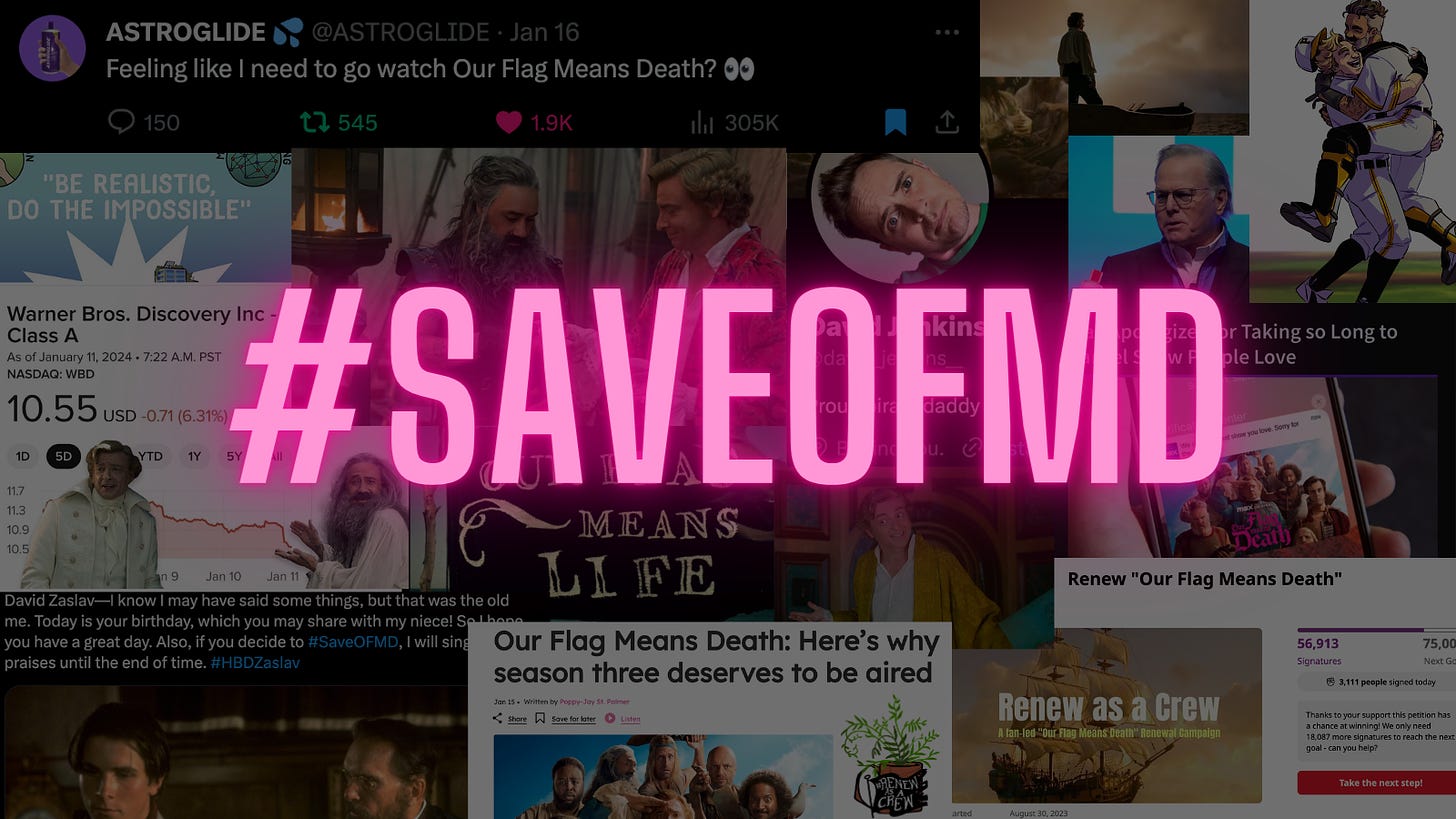

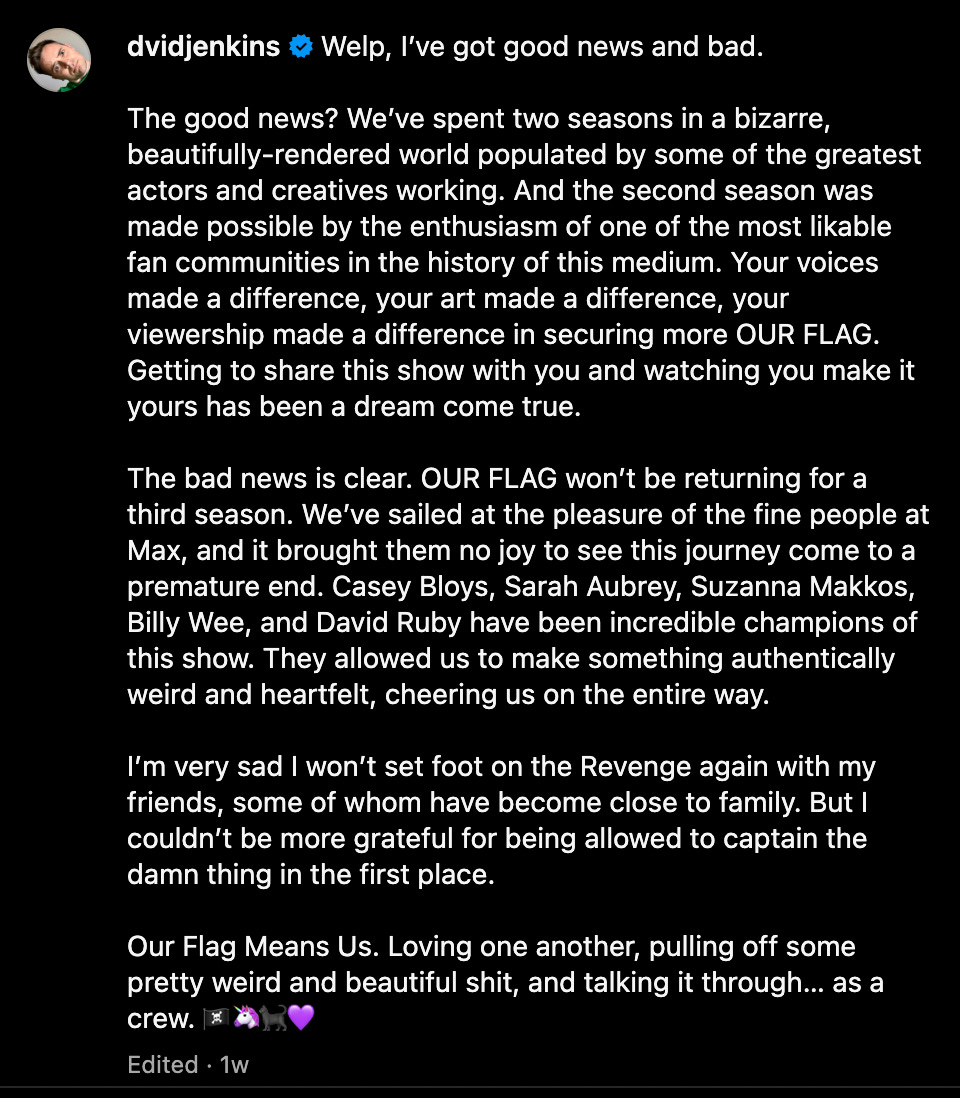


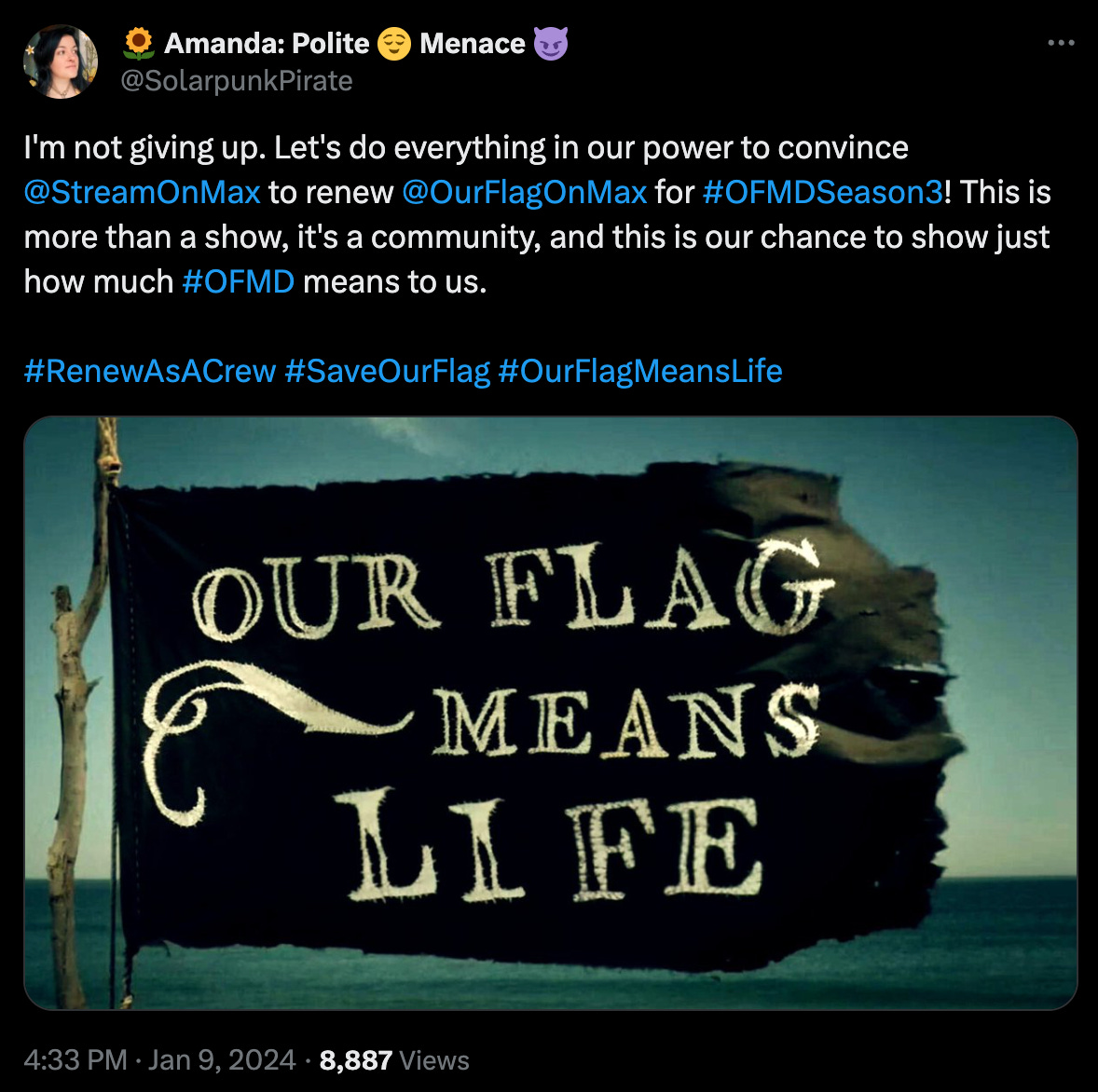
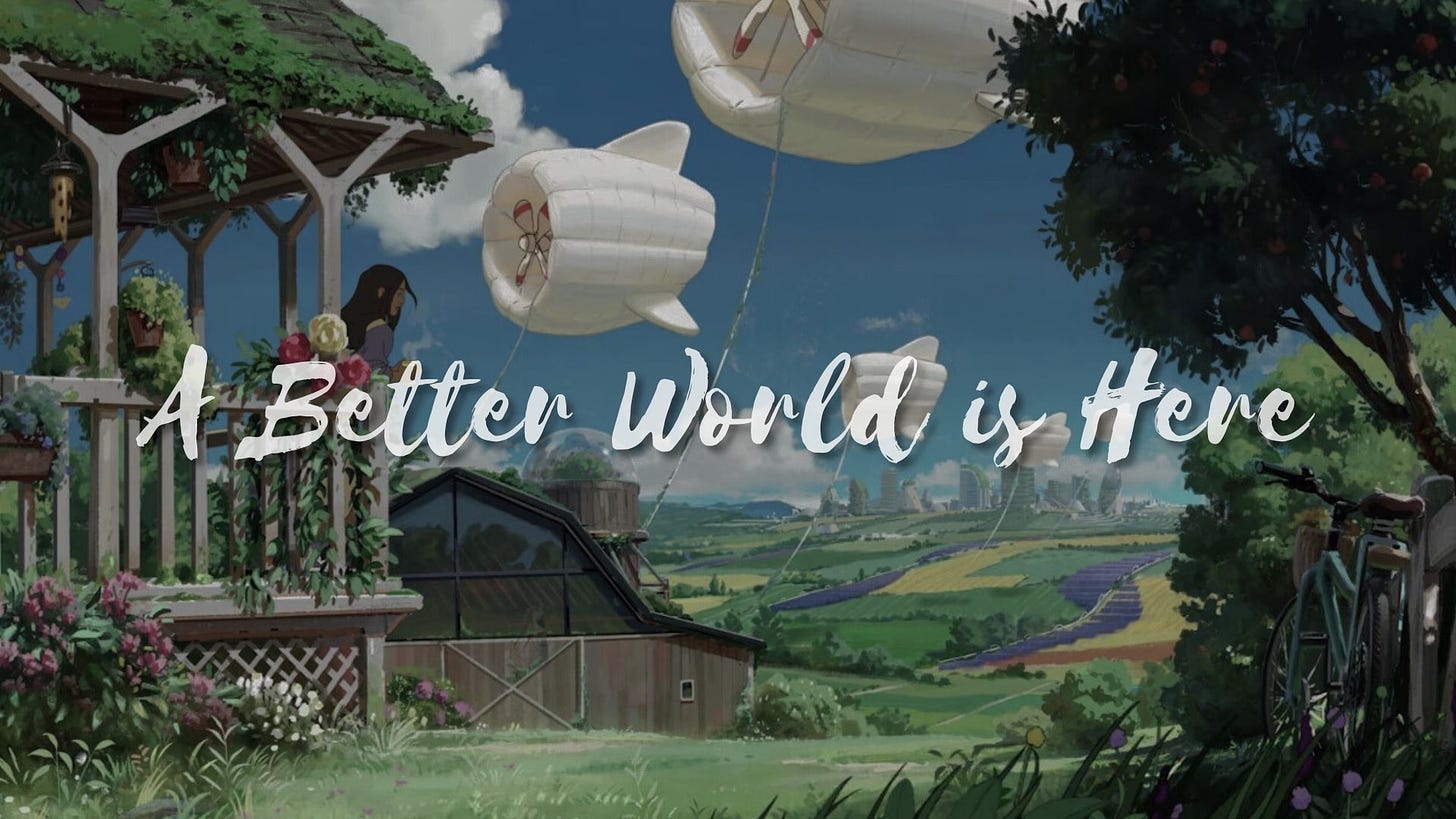
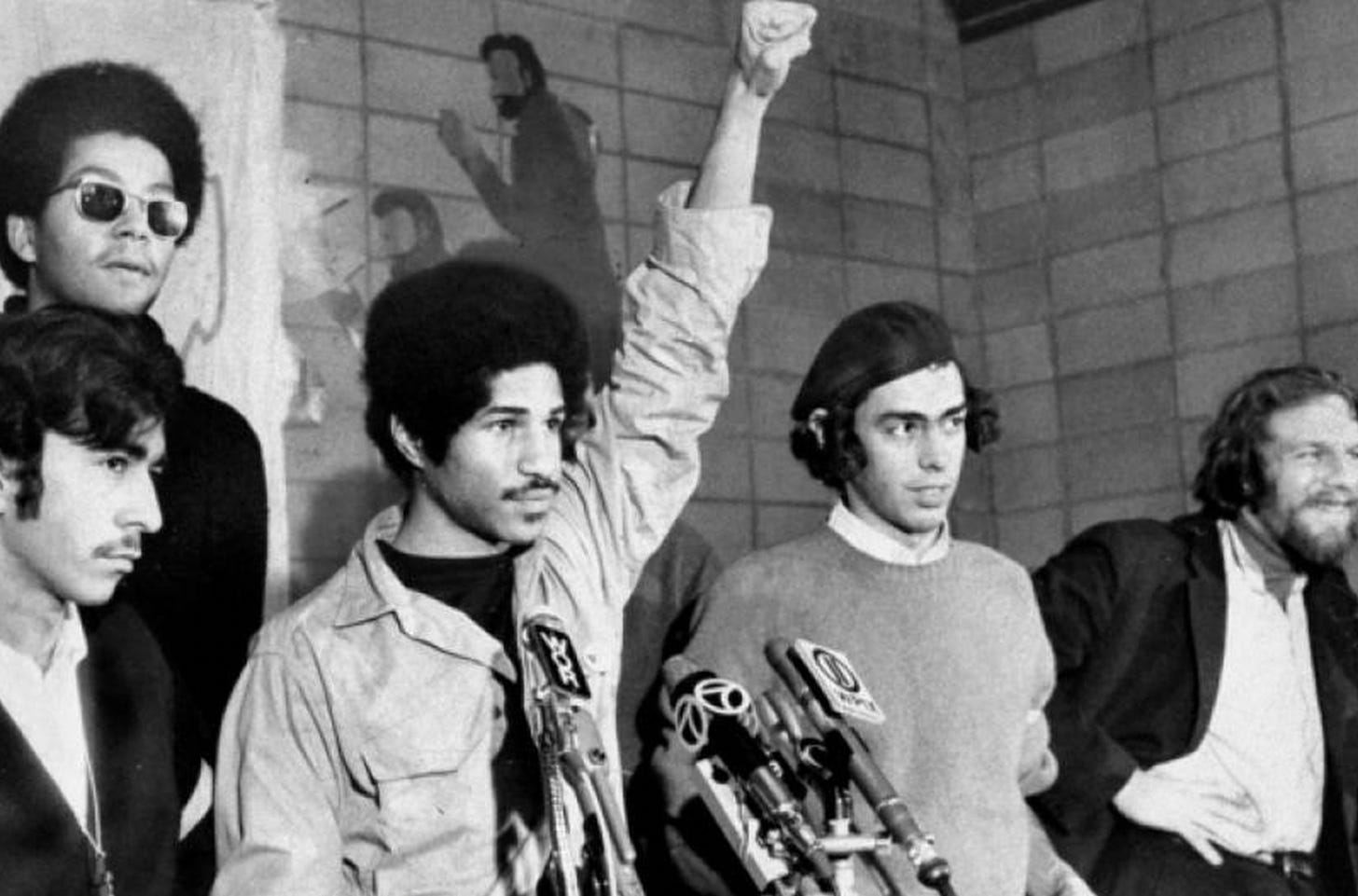
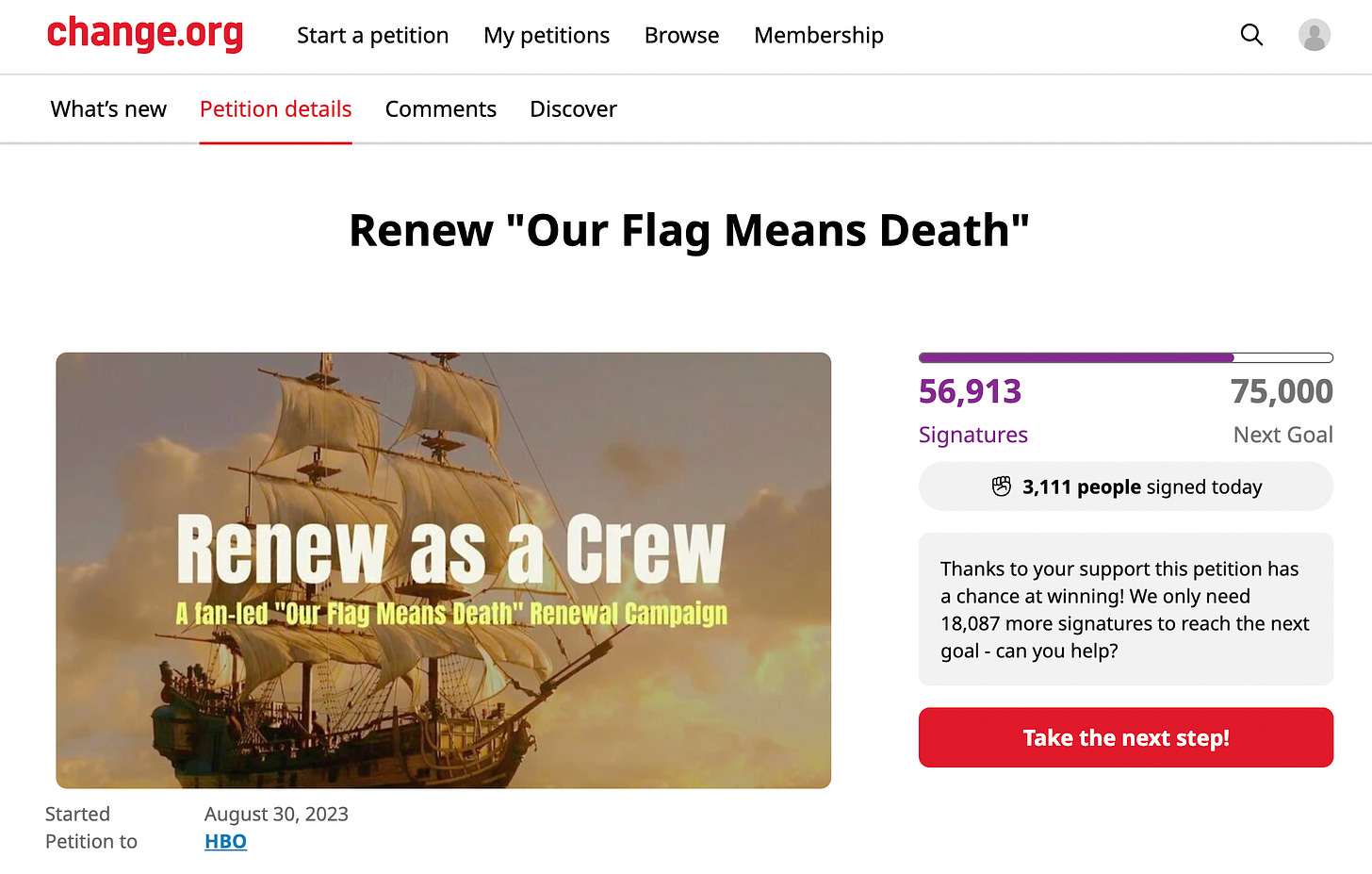
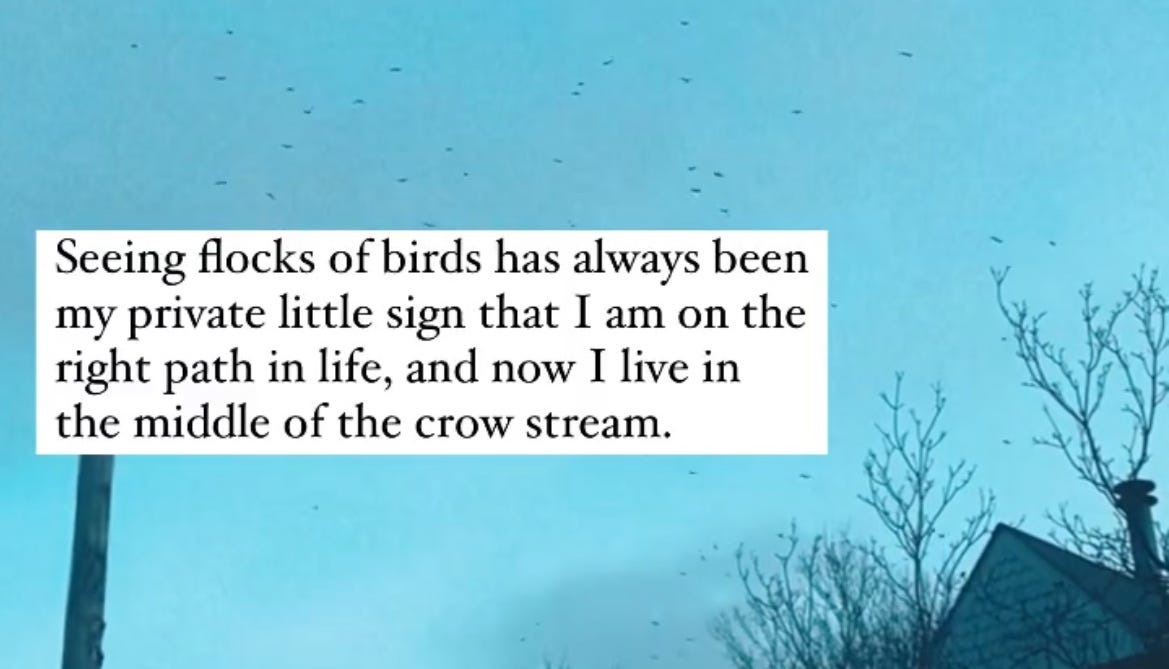
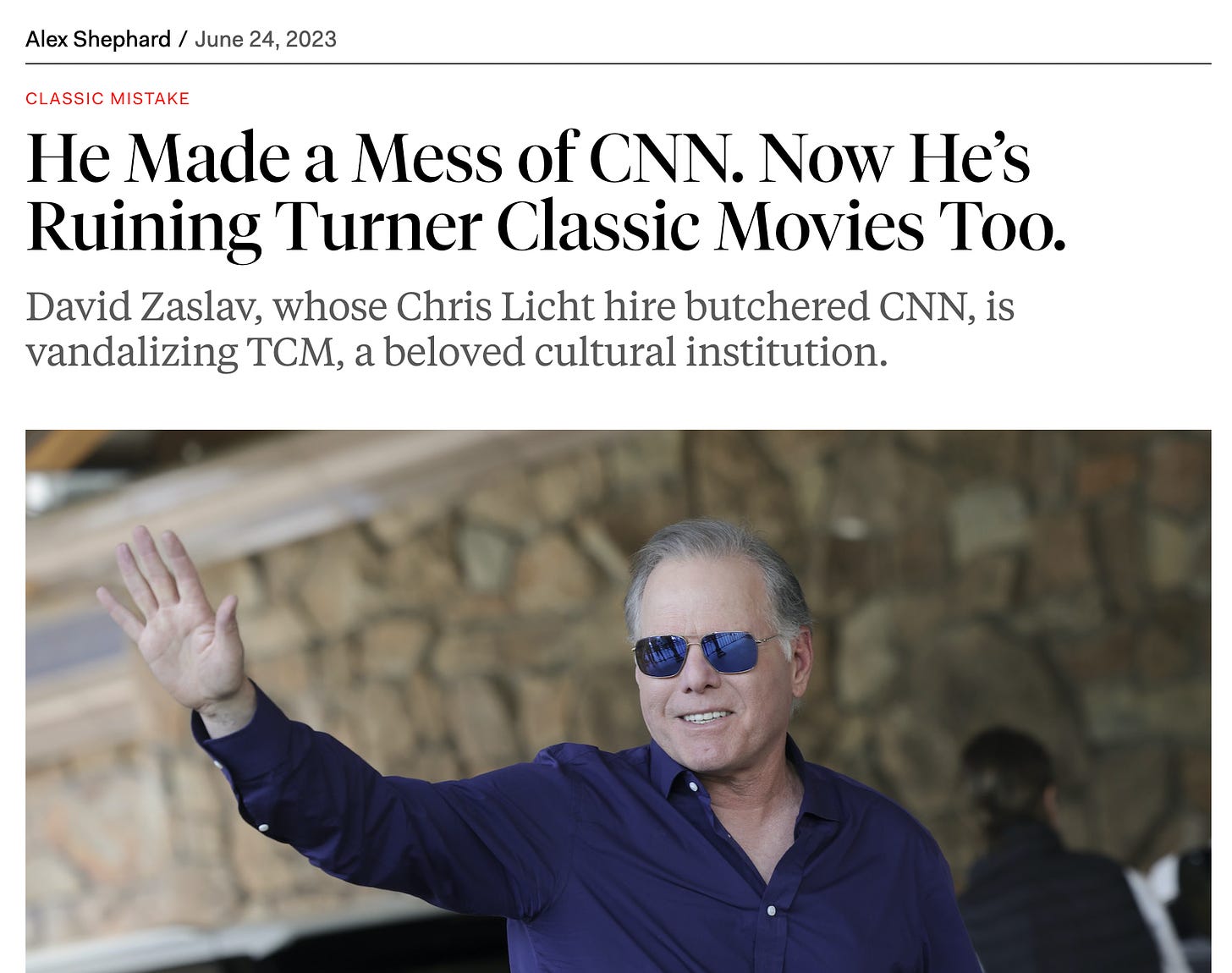
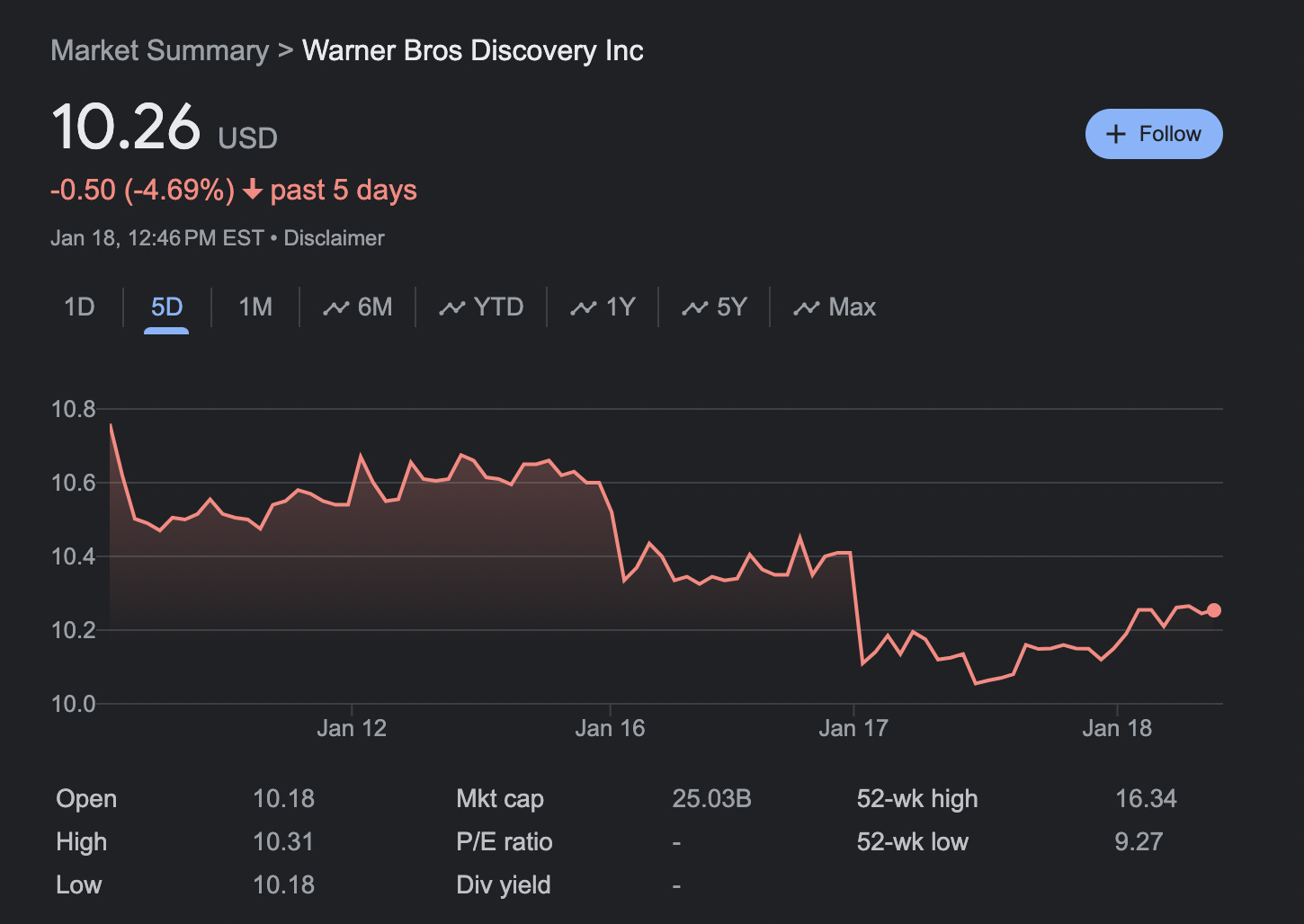
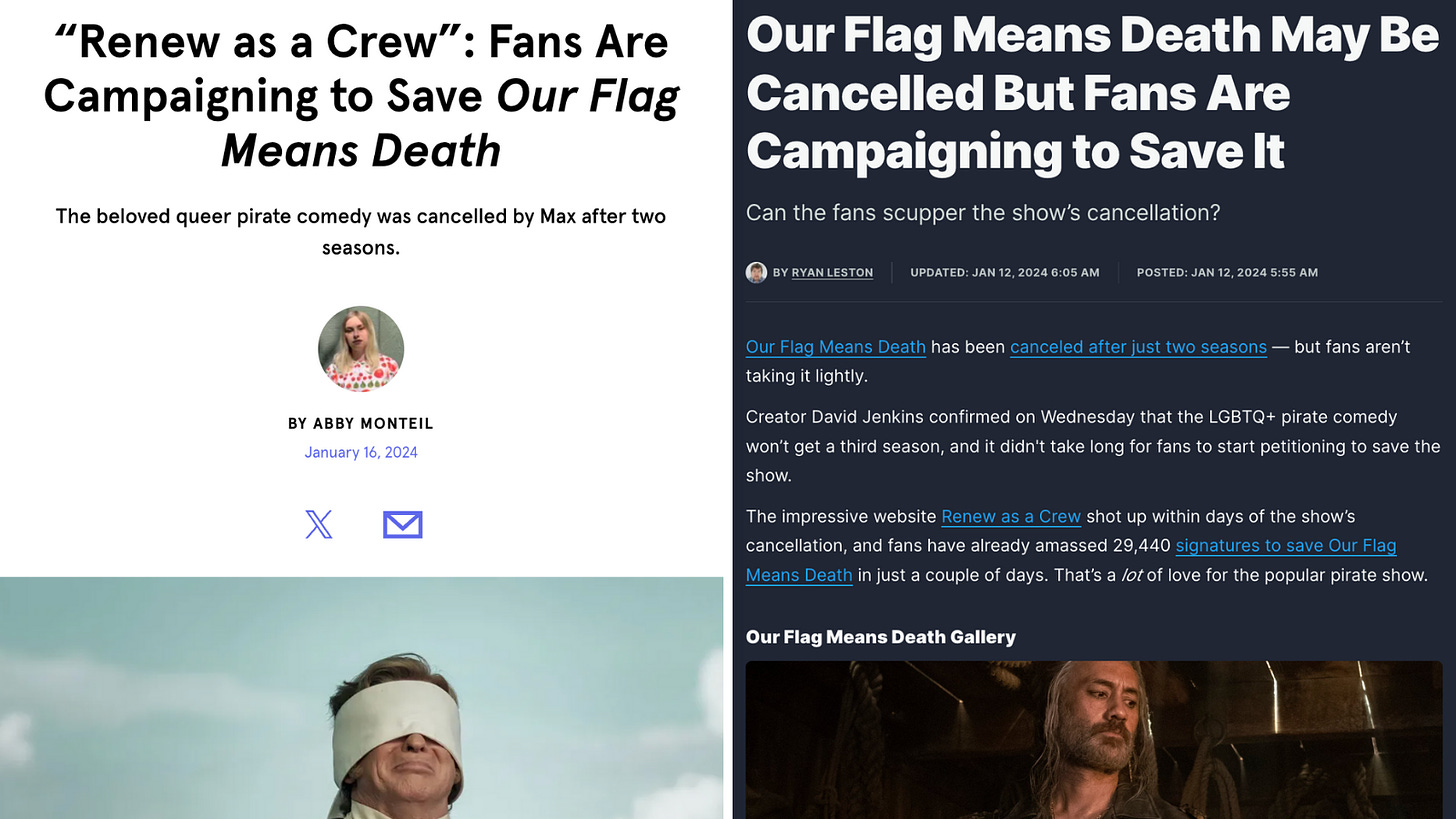
Thank you, thank you for putting into clear and thoughtful words many of the points my poor brain/heart have been spinning into an ever more snarled ball inside. My lump o’ feeling valid and maybe even beautiful, but it does little to convey to necessary others why this show matters beyond the individual. Hurrah!!